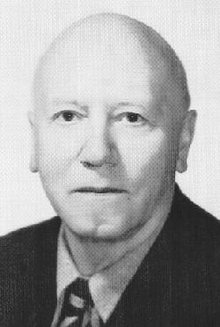Charlie Dunbar Broad
| C. D. Broad | |
|---|---|
 |
|
| Born |
Charlie Dunbar Broad 30 December 1887 Harlesden, Middlesex |
| Died | 11 March 1971 (aged 83) Cambridge, Cambridgeshire |
| Alma mater | Trinity College, Cambridge |
| Era | 20th-century philosophy |
| Region | Western Philosophy |
| School | Analytic philosophy |
|
Main interests
|
Metaphysics, epistemology, ethics, philosophy of mind, logic |
|
Notable ideas
|
Growing block universe |
|
Influenced
|
|
Charlie Dunbar Broad (30 December 1887 – 11 March 1971), usually cited as C. D. Broad, was an English epistemologist, historian of philosophy, philosopher of science, moral philosopher, and writer on the philosophical aspects of psychical research. He was known for his thorough and dispassionate examinations of arguments in such works as Scientific Thought, published in 1923, The Mind and Its Place in Nature, published in 1925, and An Examination of McTaggart's Philosophy, published in 1933.
Broad's essay on "Determinism, Indeterminism, and Libertarianism" in Ethics and the History of Philosophy (1952) introduced the philosophical terms "occurrent causation" and "non-occurrent causation", which became the basis for today's "agent causal" and "event causal" distinctions in the debates on libertarian free will.
Broad was born in Harlesden, in Middlesex, England. He was educated at Dulwich College from 1900 until 1906. He gained a scholarship to study at Trinity College, Cambridge in 1906. In 1910 he graduated with First-Class Honours, with distinction.
In 1911, he became a Fellow of Trinity College. This was a non-residential position, which enabled him to also accept a position he had applied for as an assistant lecturer at St Andrews University. He was later made a lecturer at St Andrews University, and remained there until 1920. He was appointed professor at Bristol University in 1920, and worked there until 1923, when he returned to Trinity College as a College lecturer. He was a lecturer in 'moral science' in the Faculty of philosophy at Cambridge University from 1926 until 1931. In 1931, he was appointed 'Sidgwick Lecturer' at Cambridge University. He kept this role until 1933, when he was appointed Knightbridge Professor of Moral Philosophy at Cambridge University, a position he held for twenty years, until 1953.
...
Wikipedia
